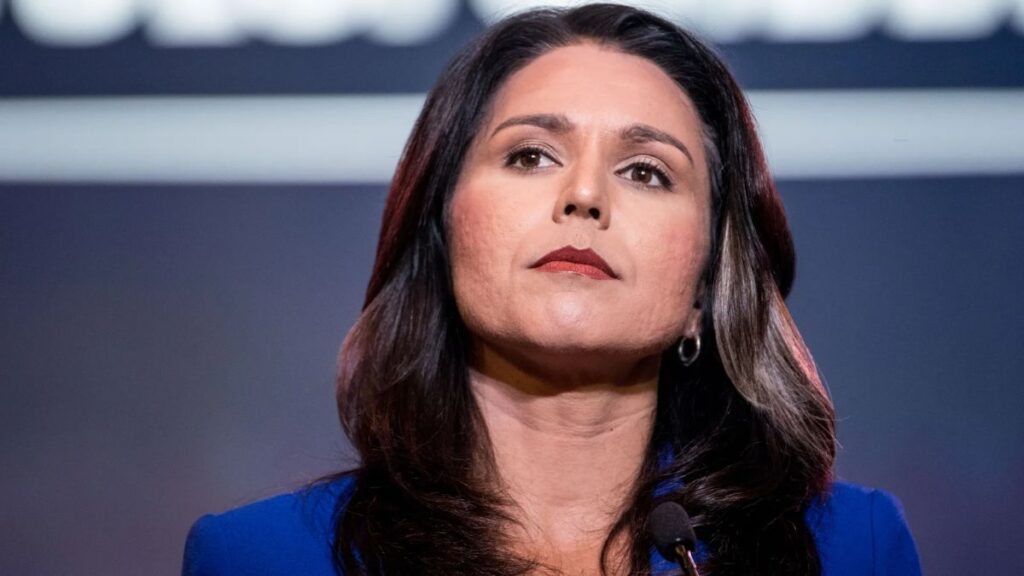In a move that has stirred political debate, former President Donald Trump has nominated Tulsi Gabbard for the role of Director of National Intelligence (DNI).
Gabbard, who made history as the first Hindu member of the U.S. Congress, has had a dynamic career marked by her transition from the Democratic to the Republican Party, her military service, and her unorthodox foreign policy views.
Trump’s decision to select Gabbard highlights his ongoing desire to reform U.S. intelligence agencies, which he has often criticized for their adversarial stance during his presidency.
In this article, we delve into Tulsi Gabbard’s background, her political journey, and what her nomination could mean for the future of U.S. intelligence.
Who is Tulsi Gabbard?
Tulsi Gabbard was born on April 12, 1981, in American Samoa and raised in Hawaii. Her early life was characterized by a deep connection to her Hindu faith and a passion for public service.
Gabbard’s political career began at a young age when she was elected to the Hawaii House of Representatives at just 21 years old, making her one of the youngest legislators in U.S. history.
Early Life and Political Career
Gabbard’s upbringing was shaped by her multicultural background and her family’s strong political involvement. She grew up practicing Hinduism and remains one of the few prominent Hindu figures in American politics.
Her political journey started with her election to the Hawaii State Legislature, but she soon left her position to serve in the Army National Guard.
| Attribute | Details |
|---|---|
| Birthplace | American Samoa |
| Political Party | Initially Democratic, now Republican |
| Military Rank | Lieutenant Colonel, Army Reserve |
| Religion | Hinduism |
| Notable Achievement | First Hindu member of Congress |
Gabbard’s decision to serve in the military marked a pivotal moment in her life, influencing her views on foreign policy and national security.
A Military Veteran with Combat Experience
Gabbard’s military service is one of the defining aspects of her career. She enlisted in the Hawaii Army National Guard and was deployed to Iraq twice, where she served as a medical specialist.
Her combat experience gave her a firsthand understanding of the consequences of U.S. foreign interventions, shaping her stance on military engagement and foreign policy.
Combat Experience and Political Influence
Gabbard’s experiences in Iraq made her a vocal critic of unnecessary military interventions. She often highlighted the human and financial costs of prolonged wars, advocating for a more restrained foreign policy.
Her stance aligns with Trump’s own skepticism towards extensive U.S. military involvement overseas.
| Military Role | Details |
|---|---|
| First Deployment | Iraq (2004-2005) |
| Second Deployment | Kuwait (2008-2009) |
| Current Rank | Lieutenant Colonel, Army Reserve |
Gabbard’s unique perspective as a combat veteran has resonated with many voters who are weary of America’s ongoing military engagements.
Political Journey: From Democrat to Republican
Gabbard’s political career took a dramatic turn when she announced her departure from the Democratic Party in 2022, citing dissatisfaction with its leadership.
She described the party as an “elitist cabal of warmongers” and criticized its focus on “woke” ideologies, which she felt were disconnected from the needs of everyday Americans.
Her transition to the Republican Party was seen as a significant shift, but not entirely unexpected given her evolving political views and her vocal support for Donald Trump’s foreign policy initiatives.
Trump has praised Gabbard’s fearless approach, highlighting her willingness to challenge both Democratic and Republican leadership on issues related to national security.
Trump’s Nomination: Why Tulsi Gabbard for DNI?
Donald Trump’s decision to nominate Tulsi Gabbard as Director of National Intelligence is a bold move aimed at reshaping U.S. intelligence agencies.
Trump has frequently criticized these agencies for their perceived bias against him during his presidency, and he sees Gabbard as a reform-minded leader who can bring about the changes he desires.
Gabbard’s Role and Responsibilities
If confirmed, Gabbard would oversee 18 intelligence agencies, including the CIA and NSA. She would be responsible for coordinating the President’s Daily Brief, a key intelligence document that informs the President about the most pressing national security threats.
| Role | Responsibility |
|---|---|
| Director of National Intelligence | Overseeing 18 U.S. intelligence agencies |
| Key Task | Coordinating the President’s Daily Brief |
| Collaboration | Working with the CIA, NSA, and other key agencies |
Trump’s decision to nominate Gabbard reflects his preference for appointing leaders who share his skepticism of conventional U.S. foreign policy and are willing to challenge entrenched bureaucratic norms.
The Significance of Gabbard’s Appointment
Tulsi Gabbard’s appointment as Director of National Intelligence would be historic, making her the first Hindu to hold such a high-ranking position in the U.S. intelligence community.
Her military background, combined with her experience as a former Congresswoman, equips her with a unique skill set that could bring fresh perspectives to the intelligence field.
Potential Impact on U.S. Foreign Policy
Gabbard’s nomination signals a potential shift in U.S. foreign policy towards a more restrained approach, focusing on diplomacy rather than military intervention.
Her vocal opposition to U.S. involvement in the Middle East aligns with Trump’s campaign promise of reducing America’s military footprint abroad.
- Increased Focus on Diplomacy: Gabbard’s appointment could lead to a greater emphasis on peaceful negotiations and reducing military engagements.
- Reform of Intelligence Agencies: Trump aims to address perceived biases within intelligence agencies, and Gabbard’s appointment is seen as a step towards achieving this goal.
MUST READ: Grow ₹5,000 Monthly SIP into ₹7.9 Crores with Long-Term Investment Strategy

